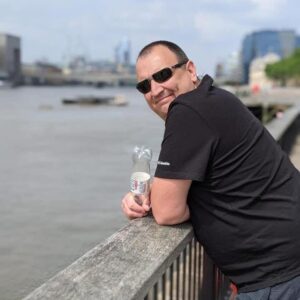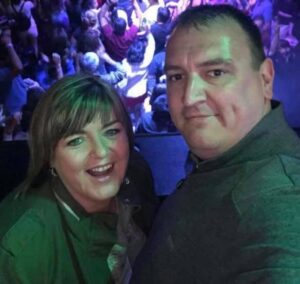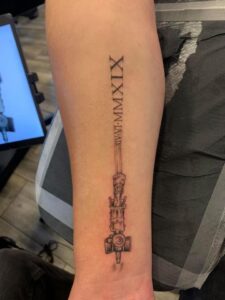
31 Mar 2025
“I went to the NHS walk-in centre – they told me I needed vitamins.”
Martin Anderton was so fit and healthy that when he first went to his doctor with mysterious symptoms in 2018 he had to re-register as he hadn’t been for 20 years.
 Martin, who lives in St Helens, Merseyside was 42 at the time. He had been having strange night sweats and had lost weight, felt tired and had ulcers in his mouth. He thought he was just under the weather but when the symptoms continued for five weeks he decided it was time to go to the doctor.
Martin, who lives in St Helens, Merseyside was 42 at the time. He had been having strange night sweats and had lost weight, felt tired and had ulcers in his mouth. He thought he was just under the weather but when the symptoms continued for five weeks he decided it was time to go to the doctor.
“I went to my GP on the Wednesday morning and they told me I needed to re-register because I hadn’t been for so long,” said Martin, now 48, who works as engineering manager. “I tried to but was then told I couldn’t have an appointment until the following Monday. So I went to the NHS walk-in centre – they told me I needed vitamins and didn’t offer me a blood test. I felt I really couldn’t carry on like that as my symptoms had got so bad, so in the afternoon I went to the A&E at Whiston Hospital and waited six hours until I was seen. This time I was given a blood test. Within 30 minutes they told me I had something wrong with my white blood cells. They admitted me to a ward and referred me for more urgent tests. I had unfortunately lost a few friends to leukaemia so even though they didn’t mention it at that time, I suspected that’s what I had.”
Martin was given a bone marrow biopsy and three days later was told he had acute lymphoblastic leukaemia (ALL). ALL is much more common in children – between 2018 and 2020 almost twice as many children (under 20 years old) were diagnosed as adults.
“The haemtologist said to me “you’re very poorly Martin” and I said “well I don’t feel it” because I really didn’t feel seriously ill at the time. He said I had a 30% chance of surviving the initial chemo and getting into remission and if this did happen, I would need a stem cell transplant. At that time it was all a blur but given a 30% chance is better than nothing so I decided to fight and stay positive.
“My treatment began the same day as my diagnosis. I had 51 sessions of chemotherapy and radiotherapy overall at Whiston. I’m an engineer and I like things done in a certain way. I asked the hospital to give me a printout of my treatment schedule – dates, times, names of drugs, everything that needed to happen. I kept a log based around it as I went along with how much I weighed, what the treatments were like etc. I felt like I was managing my destiny. And I believe it worked.”
 Wife Jacqueline and sons Craig and Lee, who were in their 20s at the time, made frequent visits to the hospital for the three and a half months Martin spent there. Eventually he was told that while treatment had been successful, he would need a stem cell transplant to improve his chances of avoiding a relapse. He was extremely fortunate to end up with what he calls ‘three and a half’ potential matches.
Wife Jacqueline and sons Craig and Lee, who were in their 20s at the time, made frequent visits to the hospital for the three and a half months Martin spent there. Eventually he was told that while treatment had been successful, he would need a stem cell transplant to improve his chances of avoiding a relapse. He was extremely fortunate to end up with what he calls ‘three and a half’ potential matches.
“My sister Jacqueline was the half. And then there were three more but one of them was perfect – a 34-year-old German man. The Total Body Irradiation (TBI) before the transplant was the worst bit of the whole thing. I have never been so sick. But I got through it.”
Martin had his stem cell transplant at the Clatterbridge Cancer Centre in the Royal Liverpool Hospital on 14th June 2019.
 “I’ve got a tattoo of a canula on my arm with my transplant date in roman numerals. I also left a square for the donor’s name but I never found out who it was so I’ve just put a question mark in the box. But of course, I think of him often and am so grateful.”
“I’ve got a tattoo of a canula on my arm with my transplant date in roman numerals. I also left a square for the donor’s name but I never found out who it was so I’ve just put a question mark in the box. But of course, I think of him often and am so grateful.”
Once through his transplant Martin was allowed to go home. He is now back at work full-time with a new employer, although still dealing with the side effects of his treatment.
“Since leukaemia I am not able to do the things I used to love like DIY and home improvements. I get tired very easily and have lots of issues with my back, which I put down to the amount of bone marrow biopsies and lumbar punctures I had. But I am here. During the treatment I was, in a way, always in denial. I used to call myself a bit of a fraud because with a couple of exceptions I never felt that ill.
“I am very fortunate to still be able to work, enjoy family life and go on holiday, even if there are some things I can no longer do. I really feel like my positive attitude and effectively managing my treatment and knowing all about it helped. I just trusted the process and am so grateful it’s worked.”
Related posts
3 February 2023
Team Bodhi goes viral with #PantsToLeukaemia campaign
A whole host of celebrities and members of the public are posing with their pants on their head for a new campaign, to show solidarity for a little boy with…
11 January 2019
Leukaemia: Investigating stem cells to prevent cancer
Dr Alice Giustacchini, University College London and John Goldman Fellow
2 October 2023
Three leading charities collaborate to fight childhood cancers
New Partnership we3can to fund research into three most common childhood cancers Today (2nd October 2023), three leading cancer charities have launched a new collaboration in order to improve the…
31 October 2023
Chris Dew joins Leukaemia UK as Director of Finances & Resources
Leukaemia UK is delighted to announce the appointment of Chris Dew as Director of Finance & Resources, following ten years as Chief Financial Officer at musical therapy charity Nordoff-Robbins. The…